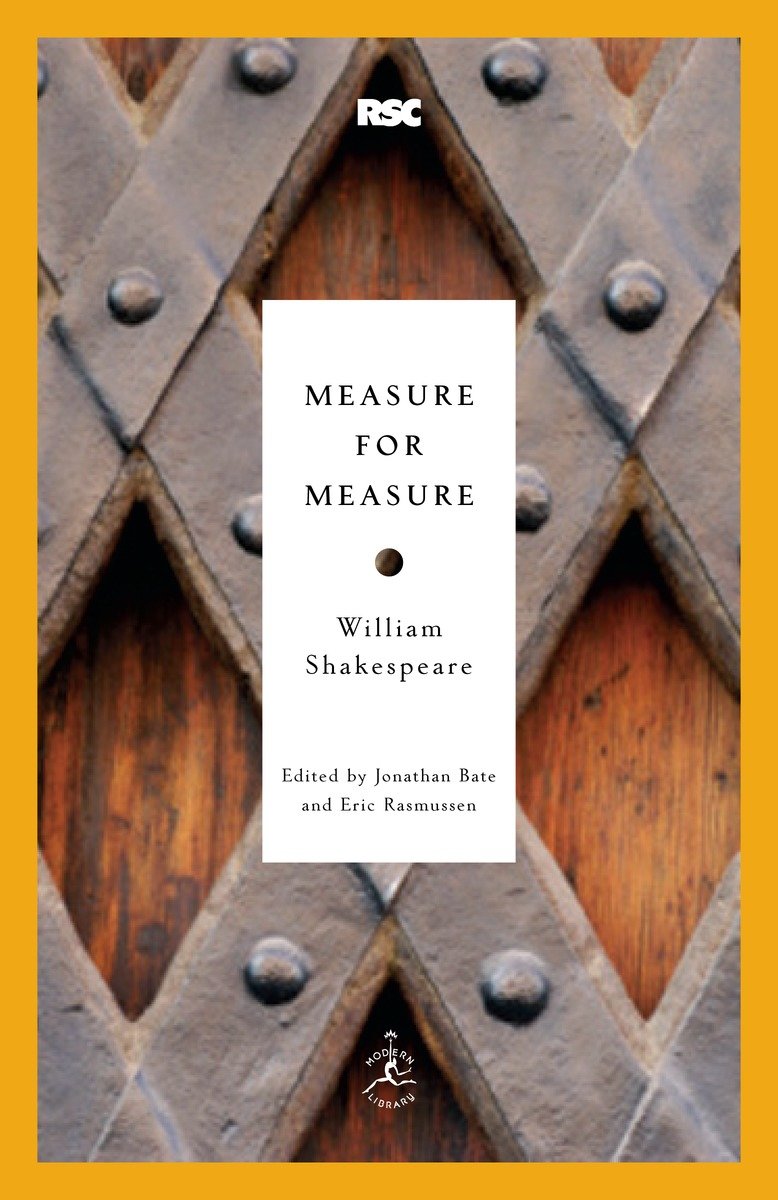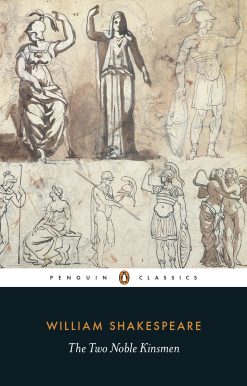Measure for Measure
9.00 JOD
Please allow 2 – 5 weeks for delivery of this item
Add to Gift RegistryDescription
Eminent Shakespearean scholars Jonathan Bate and Eric Rasmussen provide a fresh new edition of this powerful play that explores sexual hypocrisy and questions morality at all levels of society. This volume also includes more than a hundred pages of exclusive features, including: • an original Introduction to Measure for Measure• incisive scene-by-scene synopsis and analysis with vital facts about the work• commentary on past and current productions based on interviews with leading directors, actors, and designers• photographs of key RSC productions• an overview of Shakespeare’s theatrical career and chronology of his plays Ideal for students, theater professionals, and general readers, these modern and accessible editions from the Royal Shakespeare Company set a new standard in Shakespearean literature for the twenty-first century.
Additional information
| Weight | 0.19295 kg |
|---|---|
| Dimensions | 1.3716 × 13.208 × 20.2184 cm |
| Author(s) | |
| Format Old` | |
| Language | |
| Pages | 224 |
| Publisher | |
| Year Published | 2010-9-14 |
| Imprint | |
| Publication City/Country | USA |
| ISBN 10 | 0812969286 |
| About The Author | William Shakespeare was born in Stratford-upon-Avon in April 1564, and his birth is traditionally celebrated on April 23. The facts of his life, known from surviving documents, are sparse. He was one of eight children born to John Shakespeare, a merchant of some standing in his community. William probably went to the King’s New School in Stratford, but he had no university education. In November 1582, at the age of eighteen, he married Anne Hathaway, eight years his senior, who was pregnant with their first child, Susanna. She was born on May 26, 1583. Twins, a boy, Hamnet ( who would die at age eleven), and a girl, Judith, were born in 1585. By 1592 Shakespeare had gone to London working as an actor and already known as a playwright. A rival dramatist, Robert Greene, referred to him as “an upstart crow, beautified with our feathers.” Shakespeare became a principal shareholder and playwright of the successful acting troupe, the Lord Chamberlain’s Men (later under James I, called the King’ s Men). In 1599 the Lord Chamberlain’s Men built and occupied the Globe Theater in Southwark near the Thames River. Here many of Shakespeare’s plays were performed by the most famous actors of his time, including Richard Burbage, Will Kempe, and Robert Armin. In addition to his 37 plays, Shakespeare had a hand in others, including Sir Thomas More and The Two Noble Kinsmen, and he wrote poems, including Venus and Adonis and The Rape of Lucrece. His 154 sonnets were published, probably without his authorization, in 1609. In 1611 or 1612 he gave up his lodgings in London and devoted more and more time to retirement in Stratford, though he continued writing such plays as The Tempest and Henry VII until about 1613. He died on April 23 1616, and was buried in Holy Trinity Church, Stratford. No collected edition of his plays was published during his life-time, but in 1623 two members of his acting company, John Heminges and Henry Condell, put together the great collection now called the First Folio. |
| Excerpt From Book | Act 1 Scene 1 running scene 1Enter Duke, Escalus, Lords [and Attendants]DUKE Escalus.ESCALUS My lord.DUKE Of government the properties to unfoldWould seem in me t'affect speech and discourse,Since I am put to know that your own scienceExceeds, in that, the lists of all adviceMy strength can give you. Then no more remainsBut that to your sufficiency as your worth is able,And let them work. The nature of our people,Our city's institutions, and the termsFor common justice, you're as pregnant inAs art and practice hath enrichèd anyThat we remember. There is our commission, Hands him a paperFrom which we would not have you warp. Call hither,I say, bid come before us Angelo. [Exit an Attendant]What figure of us think you he will bear?For you must know, we have with special soulElected him our absence to supply;Lent him our terror, dressed him with our love,And given his deputation all the organsOf our own power. What think you of it?ESCALUS If any in Vienna be of worthTo undergo such ample grace and honour,It is Lord Angelo.DUKE Look where he comes.Enter AngeloANGELO Always obedient to your grace's will,I come to know your pleasure.DUKE Angelo,There is a kind of character in thy lifeThat to th'observer doth thy historyFully unfold. Thyself and thy belongingsAre not thine own so proper as to wasteThyself upon thy virtues, they on thee.Heaven doth with us as we with torches do,Not light them for themselves: for if our virtuesDid not go forth of us, 'twere all alikeAs if we had them not. Spirits are not finely touchedBut to fine issues, nor nature never lendsThe smallest scruple of her excellenceBut, like a thrifty goddess, she determinesHerself the glory of a creditor,Both thanks and use. But I do bend my speechTo one that can my part in him advertise.Hold therefore, Angelo.In our remove be thou at full ourself:Mortality and mercy in ViennaLive in thy tongue and heart. Old Escalus,Though first in question, is thy secondary.Take thy commission. Offers a paperANGELO Now, good my lord,Let there be some more test made of my mettle,Before so noble and so great a figureBe stamped upon it.DUKE No more evasion.We have with a leavened and preparèd choiceProceeded to you: therefore take your honours. Angelo takesOur haste from hence is of so quick condition paperThat it prefers itself and leaves unquestionedMatters of needful value. We shall write to you,As time and our concernings shall importune,How it goes with us, and do look to knowWhat doth befall you here. So, fare you well:To th'hopeful execution do I leave youOf your commissions.ANGELO Yet give leave, my lord,That we may bring you something on the way.DUKE My haste may not admit it,Nor need you, on mine honour, have to doWith any scruple. Your scope is as mine own,So to enforce or qualify the lawsAs to your soul seems good. Give me your hand,I'll privily away. I love the people,But do not like to stage me to their eyes:Though it do well, I do not relish wellTheir loud applause and aves vehement,Nor do I think the man of safe discretionThat does affect it. Once more, fare you well.ANGELO The heavens give safety to your purposes!ESCALUS Lead forth and bring you back in happiness!DUKE I thank you. Fare you well. ExitESCALUS I shall desire you, sir, to give me leaveTo have free speech with you; and it concerns meTo look into the bottom of my place.A power I have, but of what strength and natureI am not yet instructed.ANGELO 'Tis so with me. Let us withdraw together,And we may soon our satisfaction haveTouching that point.ESCALUS I'll wait upon your honour. ExeuntAct 1 Scene 2 running scene 2Enter Lucio and two other GentlemenLUCIO If the duke with the other dukes come not to composition with the King of Hungary, why then all the dukes fall upon the king.FIRST GENTLEMAN Heaven grant us its peace, but not the King of Hungary's!SECOND GENTLEMAN Amen.LUCIO Thou concludest like the sanctimonious pirate, that went to sea with the Ten Commandments, but scraped one out of the table.SECOND GENTLEMAN 'Thou shalt not steal'?LUCIO Ay, that he razed.FIRST GENTLEMAN Why, 'twas a commandment to command the captain and all the rest from their functions: they put forth to steal. There's not a soldier of us all that, in the thanksgiving before meat, do relish the petition well that prays for peace.SECOND GENTLEMAN I never heard any soldier dislike it.LUCIO I believe thee; for I think thou never wast where grace was said.SECOND GENTLEMAN No? A dozen times at least.FIRST GENTLEMAN What, in metre?LUCIO In any proportion or in any language.FIRST GENTLEMAN I think, or in any religion.LUCIO Ay, why not? Grace is grace, despite of all controversy: as for example, thou thyself art a wicked villain, despite of all grace.FIRST GENTLEMAN Well, there went but a pair of shears between us.LUCIO I grant, as there may between the lists and the velvet. Thou art the list.FIRST GENTLEMAN And thou the velvet. Thou art good velvet; thou'rt a three-piled piece, I warrant thee. I had as lief be a list of an English kersey as be piled, as thou art piled, for a French velvet. Do I speak feelingly now?LUCIO I think thou dost, and indeed, with most painful feeling of thy speech. I will, out of thine own confession, learn to begin thy health, but, whilst I live, forget to drink after thee.FIRST GENTLEMAN I think I have done myself wrong, have I not?SECOND GENTLEMAN Yes, that thou hast, whether thou art tainted or free.Enter Bawd [Mistress Overdone]LUCIO Behold, behold, where Madam Mitigation comes! I have purchased as many diseases under her roof as come to-SECOND GENTLEMAN To what, I pray?LUCIO Judge.SECOND GENTLEMAN To three thousand dolours a year.FIRST GENTLEMAN Ay, and more.LUCIO A French crown more.FIRST GENTLEMAN Thou art always figuring diseases in me, but thou art full of error, I am sound.LUCIO Nay, not as one would say, healthy: but so sound as things that are hollow; thy bones are hollow, impiety has made a feast of thee.FIRST GENTLEMAN How now! Which of your To Mistress Overdonehips has the most profound sciatica?MISTRESS OVERDONE Well, well. There's one yonder arrested and carried to prison was worth five thousand of you all.SECOND GENTLEMAN Who's that, I pray thee?MISTRESS OVERDONE Marry, sir, that's Claudio, Signior Claudio.FIRST GENTLEMAN Claudio to prison? 'Tis not so.MISTRESS OVERDONE Nay, but I know 'tis so. I saw him arrested, saw him carried away, and, which is more, within these three days his head to be chopped off.LUCIO But, after all this fooling, I would not have it so. Art thou sure of this?MISTRESS OVERDONE I am too sure of it. And it is for getting Madam Julietta with child.LUCIO Believe me, this may be: he promised to meet me two hours since, and he was ever precise in promise-keeping.SECOND GENTLEMAN Besides, you know, it draws something near to the speech we had to such a purpose.FIRST GENTLEMAN But most of all agreeing with the proclamation.LUCIO Away! Let's go learn the truth of it.Exeunt [Lucio and Gentlemen]MISTRESS OVERDONE Thus, what with the war, what with the sweat, what with the gallows and what with poverty, I am custom-shrunk.Enter Clown [Pompey]How now? What's the news with you?POMPEY Yonder man is carried to prison.MISTRESS OVERDONE Well, what has he done?POMPEY A woman.MISTRESS OVERDONE But what's his offence?POMPEY Groping for trouts in a peculiar river.MISTRESS OVERDONE What, is there a maid with child by him?POMPEY No, but there's a woman with maid by him. You have not heard of the proclamation, have you?MISTRESS OVERDONE What proclamation, man?POMPEY All houses in the suburbs of Vienna must be plucked down.MISTRESS OVERDONE And what shall become of those in the city?POMPEY They shall stand for seed: they had gone down too, but that a wise burgher put in for them.MISTRESS OVERDONE But shall all our houses of resort in the suburbs be pulled down?POMPEY To the ground, mistress.MISTRESS OVERDONE Why, here's a change indeed in the commonwealth! What shall become of me?POMPEY Come, fear you not: good counsellors lack no clients. Though you change your place, you need not change your trade: I'll be your tapster still. Courage! There will be pity taken on you; you that have worn your eyes almost out in the service, you will be considered.MISTRESS OVERDONE What's to do here, Thomas tapster? Let's withdraw.POMPEY Here comes Signior Claudio, led by the provost to prison, and there's Madam Juliet. ExeuntAct 1 Scene 3 running scene 2 continuesEnter Provost, Claudio, Juliet, Officers; Lucio and the two Gentlemen [follow]CLAUDIO Fellow, why dost thou show me thus to th'world?Bear me to prison, where I am committed.PROVOST I do it not in evil disposition,But from Lord Angelo by special charge.CLAUDIO Thus can the demigod AuthorityMake us pay down for our offence by weightThe words of heaven; on whom it will, it will,On whom it will not, so. Yet still 'tis just.LUCIO Why, how now, Claudio? Whence comes this restraint?CLAUDIO From too much liberty, my Lucio, liberty:As surfeit is the father of much fast,So every scope by the immoderate useTurns to restraint. Our natures do pursue,Like rats that ravin down their proper bane,A thirsty evil, and when we drink we die.LUCIO If I could speak so wisely under an arrest, I would send for certain of my creditors: and yet, to say the truth, I had as lief have the foppery of freedom as the morality of imprisonment. What's thy offence, Claudio?CLAUDIO What but to speak of would offend again.LUCIO What, is't murder?CLAUDIO No.LUCIO Lechery?CLAUDIO Call it so.PROVOST Away, sir. You must go.CLAUDIO One word, good friend. Lucio, a word with you.LUCIO A hundred, if they'll do you any good.Is lechery so looked after?CLAUDIO Thus stands it with me: upon a true contractI got possession of Julietta's bed.You know the lady, she is fast my wife,Save that we do the denunciation lackOf outward order. This we came not toOnly for propagation of a dowerRemaining in the coffer of her friends,From whom we thought it meet to hide our loveTill time had made them for us. But it chancesThe stealth of our most mutual entertainmentWith character too gross is writ on Juliet.LUCIO With child, perhaps?CLAUDIO Unhappily, even so.And the new deputy now for the duke -Whether it be the fault and glimpse of newness,Or whether that the body public beA horse whereon the governor doth ride,Who, newly in the seat, that it may knowHe can command, lets it straight feel the spur:Whether the tyranny be in his place,Or in his eminence that fills it up,I stagger in – but this new governorAwakes me all the enrollèd penaltiesWhich have, like unscoured armour, hung by th'wallSo long that nineteen zodiacs have gone roundAnd none of them been worn; and, for a name,Now puts the drowsy and neglected actFreshly on me. 'Tis surely for a name.LUCIO I warrant it is: and thy head stands so tickle on thy shoulders that a milkmaid, if she be in love, may sigh it off. Send after the duke and appeal to him.CLAUDIO I have done so, but he's not to be found.I prithee, Lucio, do me this kind service:This day my sister should the cloister enterAnd there receive her approbation.Acquaint her with the danger of my state,Implore her, in my voice, that she make friendsTo the strict deputy: bid herself assay him.I have great hope in that, for in her youthThere is a prone and speechless dialect,Such as move men. Beside, she hath prosperous artWhen she will play with reason and discourse,And well she can persuade.LUCIO I pray she may; as well for the encouragement of the like, which else would stand under grievous imposition, as for the enjoying of thy life, who I would be sorry should be thus foolishly lost at a game of tick-tack. I'll to her.CLAUDIO I thank you, good friend Lucio.LUCIO Within two hours.CLAUDIO Come, officer, away! ExeuntAct 1 Scene 4 running scene 3Enter Duke and Friar ThomasDUKE No, holy father, throw away that thought:Believe not that the dribbling dart of loveCan pierce a complete bosom. Why I desire theeTo give me secret harbour hath a purposeMore grave and wrinkled than the aims and endsOf burning youth.FRIAR THOMAS May your grace speak of it?DUKE My holy sir, none better knows than youHow I have ever loved the life removed,And held in idle price to haunt assembliesWhere youth and cost and witless bravery keeps.I have delivered to Lord Angelo -A man of stricture and firm abstinence -My absolute power and place here in Vienna,And he supposes me travelled to Poland,For so I have strewed it in the common ear,And so it is received. Now, pious sir,You will demand of me why I do this.FRIAR THOMAS Gladly, my lord.DUKE We have strict statutes and most biting laws,The needful bits and curbs to headstrong weeds,Which for this fourteen years we have let slip,Even like an o'ergrown lion in a caveThat goes not out to prey. Now, as fond fathers,Having bound up the threat'ning twigs of birch,Only to stick it in their children's sightFor terror, not to use, in time the rodBecomes more mocked than feared: so our decrees,Dead to infliction, to themselves are dead,And liberty plucks justice by the nose,The baby beats the nurse, and quite athwartGoes all decorum.FRIAR THOMAS It rested in your graceTo unloose this tied-up justice when you pleased:And it in you more dreadful would have seemedThan in Lord Angelo.DUKE I do fear, too dreadful.Sith 'twas my fault to give the people scope,'Twould be my tyranny to strike and gall themFor what I bid them do, for we bid this be done,When evil deeds have their permissive passAnd not the punishment. Therefore indeed, my father,I have on Angelo imposed the office,Who may in th'ambush of my name strike home,And yet my nature never in the fightTo do in slander. And to behold his sway,I will, as 'twere a brother of your order,Visit both prince and people: therefore, I prithee,Supply me with the habit and instruct meHow I may formally in person bear meLike a true friar. More reasons for this actionAt our more leisure shall I render you;Only, this one: Lord Angelo is precise,Stands at a guard with envy, scarce confessesThat his blood flows, or that his appetiteIs more to bread than stone. Hence shall we see,If power change purpose, what our seemers be. Exeunt |
Only logged in customers who have purchased this product may leave a review.






Reviews
There are no reviews yet.